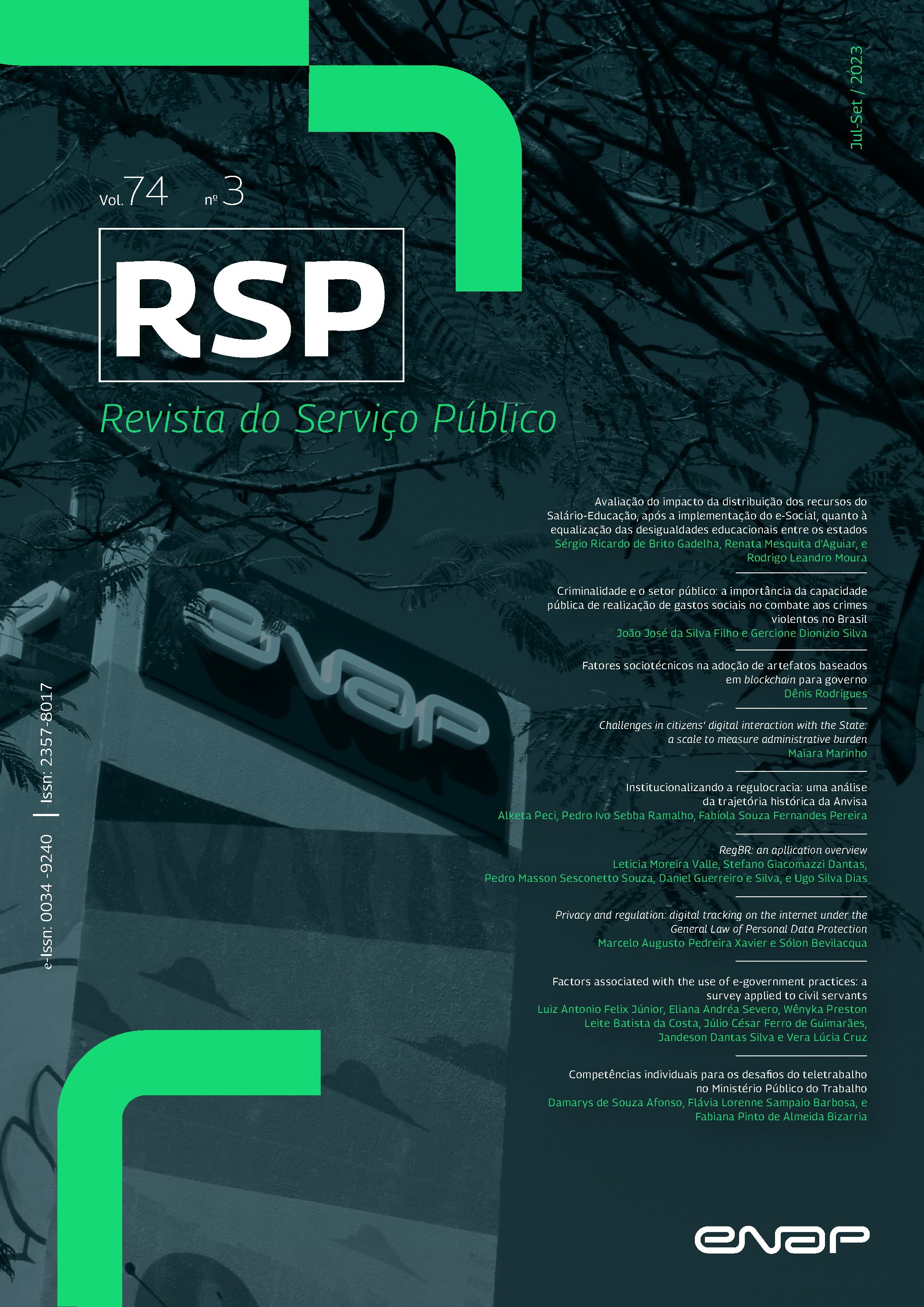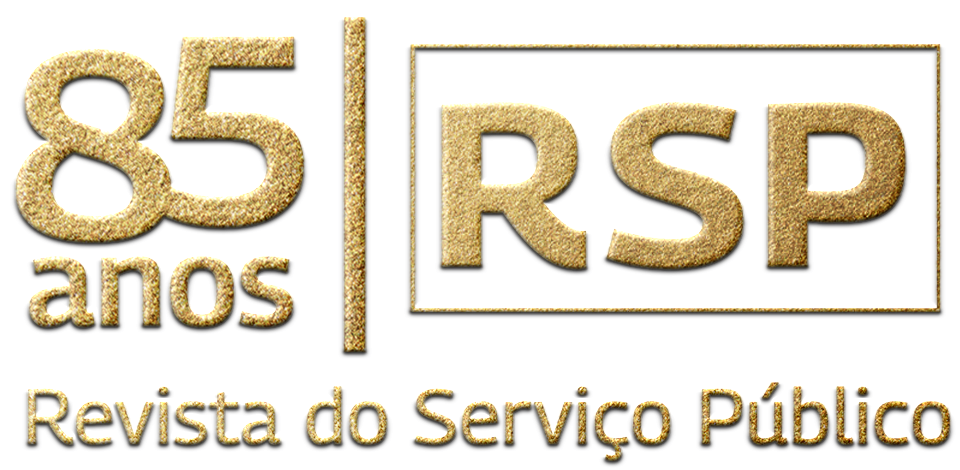Individual competences for the challenges of telework in the Public Ministry of Labor
Keywords:
Telework; Challenges; Competencies; Public Administration.Abstract
With the pandemic of Covid-19, telework has gained renewed interest and may come to be consolidated in many contexts, such as in public service in Brazil. Given this possibility, the promotion of competencies for the achievement of results in telework becomes an important perspective, being imperative to understand them in this scenario. Therefore, the competencies identified in the literature as necessary for the development of telework were identified (managerial or planning, technical, communicative, social, behavioral, technological, and analytical), from which it was developed a research instrument, an interview script, applied in a public organization, with 27 (twenty-seven) participants. The interviews were treated from the content analysis, listing in categories the challenges of telework in seven areas (planning, technical performance, communication, socio-professional relations, personal and organizational, technology, and understanding of work), as well as twenty individual skills to cope with them, linked to the theoretical categories.
Downloads
References
AFONSO, D. S.; BARBOSA, F. L. S.; BIZARRIA, F. P. De A. Telework, virtual work or telework: skills for work in the urgency of a major crisis. International Journal For Innovation Education And Research, v. 9, p. 519-540. 2021.
ALMEIDA, S. C. D.; SANTOS, A. M. Z. Gestão do conhecimento na educação a distância: propondo competências para o nível operacional. Revista Ibero-Americana de Estudos em Educação. Araraquara, v. 12, p. 332–349, jan./mar. 2017.
ALON, T.; DOEPKE, M.; OLMSTEAD-RUMSEY, J.; TERTILT, M. The impact of covid-19 on gender equality. Cambridge, MA: National Bureau of Economic Research, apr. 2020. Disponível em: http://www.nber.org/papers/w26947 Acesso em: jan. 2021.
ALVES-MAZZOTTI, A. J.; GEWANDSZNAJDER, F. O método nas ciências naturais e sociais: pesquisa quantitativa e qualitativa. São Paulo: Pioneira. 1998.
ANTUNES, E. D.; FISCHER, F. M. A justiça não pode parar?! Os impactos da COVID-19 na trajetória da política de teletrabalho do Judiciário Federal. Revista Brasileira de Saúde Ocupacional, São Paulo, v. 45, e38. 2020.
BAERT, S.; LIPPENS, L.; MOENS, E.; STERKENS, P.; WEYTJENS, J. How do we think the covid-19 crisis will affect our careers (if any remain)? Bonn: Institute of Labor Economics, apr. 2020.
BAERT, S.; LIPPENS, L.; MOENS, E.; STERKENS, P.; WEYTJENS, J. The covid-19 crisis and telework: a research survey on experiences, expectations and hopes, Bonn: Institute of Labor Economics, may. 2020.
BARDIN, L. Análise de conteúdo. São Paulo: Edições 70. 2011.
BAUWENS, R.; MUYLAERT, J.; CLARYSSE, E.; AUDENAERT, M.; DECRAMER, A. Teachers’ acceptance and use of digital learning environments after hours: implications for work-life balance and the role of integration preference. Computers in Human Behavior, v. 112, p. 106479, nov. 2020.
BERALDO, R. M. F.; MACIEL, D. A. Competências do professor no uso das TDIC e de ambientes virtuais. Psicologia Escolar e Educacional. Maringá, v. 20, n. 2, p. 209-218, ago. 2016.
BERGUE, S. T. Gestão de Pessoas: liderança e competências para o setor público. Brasília: Enap. 2019.
BITENCOURT, C. C. A gestão de competências gerenciais – a contribuição da aprendizagem organizacional. Tese (Doutorado em Administração). Universidade Federal do Rio Grande do Sul, Porto Alegre. 2001.
BOIAROV, S. Telework and its effects in Argentina. In: Messenger, J. C. (Ed.). Telework in the 21st century – an evolutionary perspective. Geneva: International Labour Office, p. 172-210. 2019.
BONACINI, L.; GALLO, G.; SCICCHITANO, S. Working from home and income inequality: risks of a ‘new normal’ with COVID-19. Journal of Population Economics, v. 34, p. 303–360. 2021.
BRASIL. Decreto nº 9.991, de 28 de agosto de 2019. Dispõe sobre a Política Nacional de Desenvolvimento de Pessoas da administração pública federal direta, autárquica e fundacional, e regulamenta dispositivos da Lei nº 8.112, de 11 de dezembro de 1990, quanto a licenças e afastamentos para ações de desenvolvimento. 2019. Disponível em: http://www.planalto.gov.br/ccivil_03/_Ato2019-2022/2019/Decreto/D9991.htm Acesso em: jan. 2021.
BRASIL. Lei nº 13.467, de 13 de julho de 2017. Altera a Consolidação das Leis do Trabalho (CLT), aprovada pelo Decreto-Lei nº 5.452, de 1º de maio de 1943, e as Leis n º 6.019, de 3 de janeiro de 1974, 8.036, de 11 de maio de 1990, e 8.212, de 24 de julho de 1991, a fim de adequar a legislação às novas relações de trabalho. 2017. Disponível em: http://www.planalto.gov.br/ccivil_03/_ato2015-2018/2017/lei/l13467.htm Acesso em: jan. 2021.
BRUNETTI, F.; MATT, D.T.; BONFANTI, A.; LONGHI, A.; PEDRINI, G.; ORZES, G. Digital transformation challenges: strategies emerging from a multi-stakeholder approach. The TQM Journal. v. 32, n. 4, p. 697-724. 2020.
BRYNJOLFSSON, E.; HORTON, J. J.; OZIMEK, A.; ROCK, D.; SHARMA, G.; TUYE, H. Covid-19 and remote work: an early look at us data. Cambridge, MA: National Bureau of Economic Research, jun. 2020.
CASSUNDÉ, F. R. S. A.; MENDONCA, J. R. C.; BARBOSA, M. A. C. A influência das condições institucionais no desenvolvimento de competências eletrônicas dos professores para o ensino na EAD: proposição de um modelo analítico. Avaliação (Campinas), Sorocaba, v. 22, n. 2, p. 469-493, ago. 2017.
CHARALAMPOUS, M.; GRANT, C. A.; TRAMONTANO, C.; MICHAILIDIS, E. Systematically reviewing remote e-workers’ well-being at work: a multidimensional approach. European Journal of Work and Organizational Psychology, v. 28, n. 1, p. 51-73. 2019.
CNJ. Resolução nº 227, de 15 de junho de 2016. Regulamenta o teletrabalho no âmbito do Poder Judiciário e dá outras providências. Disponível em: https://atos.cnj.jus.br/files/compilado163915202007275f1f033339780.pdf. Acesso em: jan. 2021.
CNMP. Resolução nº 157, de 31 de janeiro de 2017. Regulamenta o teletrabalho no âmbito do Ministério Público e do Conselho Nacional do Ministério Público e dá outras providências. Disponível em: https://www.cnmp.mp.br/portal/images/Normas/Resolucoes/RES_157_2017.pdf. Acesso em: jan. 2021.
COELHO, F. A. C.; FAID, C.; RÊGO, M. C. B. Mapeamento de competências de suporte e de apoio pedagógico e administrativo de profissionais que atuam na modalidade a distância. Educação em Revista, v. 34, e140488. 2018.
FERNANDES, B. R. Gestão estratégica de pessoas com foco em competências. Rio de Janeiro: Elsevier. 2013.
FLEURY, M. T. L.; FLEURY, A. Construindo o conceito de competência. Revista de Administração Contemporânea. Curitiba, 5(spe), p. 183-196. 2001.
GODOY, A. S. Introdução à pesquisa qualitativa e suas possibilidades, Revista de Administração de Empresas, v. 35, n. 2, p. 57-63. 1995.
GSCHWIND, L.; VARGAS, O. Telework and its effects in Europe. In: Messenger, J. C. (Ed.). Telework in the 21st century – an evolutionary perspective. Geneva: International Labour Office, p. 36-75. 2019.
GUPTA, S.; PATHAK, G. S. Virtual team experiences in an emerging economy: a qualitative study. Journal of Organizational Change Management, v. 31, n. 4, p. 778–794. 2018.
HART, R. K. Informal virtual mentoring for team leaders and members: emergence, content, and impact. Advances in Developing Human Resources, v. 18, n. 3, p. 352-368. 2016.
JACKSON, L.; FRANSMAN, E. Flexi work, financial well-being, work–life balance and their effects on subjective experiences of productivity and job satisfaction of females in an institution of higher learning. South African Journal of Economic and Management Sciences. v. 21, n. 1, a1487. 2018.
KODAMA, M. Digitally transforming work styles in an era of infectious disease. International Journal of Information Management, v. 55, p. 102172, dez. 2020.
KRUMM, S.; KANTHAK, J.; HARTMANN, K.; HERTEL, G. What does it take to be a virtual team player? The knowledge, skills, abilities, and other characteristics required in virtual teams. Human Performance. v. 29, n. 2, p. 123-142. 2016.
KUGLER, J. L. C. Competência analítica: conceitos e estratégias para a construção da empresa inteligente. 1 ed. São Paulo: Saraiva, 2013.
LAPIERRE, L.; VAN STEENBERGEN, E.; PEETERS, M.C.W.; KLUWER, E. Juggling work and family responsibilities when involuntarily working more from home: A multiwave study of financial sales professionals. Journal of Organizational Behavior. v. 37, p. 804-822. 2016.
LISTER, K.; HARNISH, T. Telework and its effects in the United States. In: Messenger, J. C. (Ed.). Telework in the 21st century – an evolutionary perspective. Geneva: International Labour Office, p. 128-170. 2019.
MATTAR, J.; RODRIGUES, L. M. M.; CZESZAK, W.; GRACIANI, J. Competências e funções dos tutores online em educação a distância. Educação em Revista. Belo Horizonte, v. 36, e217439. 2020.
MEIRELLES, D. S.; LEON, F. H. A. D.; SANTOS, L. A. P.; FRANCISCO, R. N. V. Tecnologia e Competências Tecnológicas em Educação a Distância: um Estudo Exploratório. Future Studies Research Journal. v. 9, n. 2, p. 140-166. 2017.
MELLO, A.; DAL COLLETTO, A. Telework and its effects in Brazil. In: Messenger, J. C. (Ed.). Telework in the 21st century – an evolutionary perspective. Geneva: International Labour Office, p. 211-254. 2019.
MESSENGER, J. C. Introduction: Telework in the 21st century – an evolutionary perspective. In: Messenger, J. C. (Ed.). Telework in the 21st century – an evolutionary perspective. Geneva: International Labour Office, p. 1-34. 2019.
MINAYO, M. C. de S. O desafio do conhecimento: pesquisa qualitativa em saúde. 5. ed. São Paulo: Hucitec-Abrasco. 1998.
NAKROŠIENĖ, A.; BUČIŪNIENĖ, I.; GOŠTAUTAITĖ, B. Working from home: characteristics and outcomes of telework. International Journal of Manpower, v. 40, n. 1, p. 87-101, apr. 2019.
OIT. Teletrabalho durante e após a pandemia da COVID-19: Guia prático. Geneva: International Labour Office. 2020.
PEREIRA, S. A.; FREITAS, H. M. R. The project manager’s competencies at the mobile context of project management. Revista de Gestão e Projetos, v. 10, n. 3, p. 1-12. 2019.
RAUPP, F. M.; BEUREN, I. M. Metodologia da Pesquisa Aplicável às Ciências Sociais. In: Beuren, I. M. (org.). Como elaborar trabalhos monográficos em contabilidade: teoria e prática. 2 ed. São Paulo: Atlas, p. 76-97. 2004.
SAPIÉN-AGUILAR, A. L.; CARRERA-RAMOS, M.; PIÑÓN-HOWLET, L. C.; GUTIÉRREZ-DIEZ, M. C. Competencias de tecnología de información para el trabajo a distancia en las organizaciones en méxico. Publicaciones, v. 46, p. 31-47. 2016.
SCHULZE, J.; KRUMM, S. The “virtual team player”: a review and initial model of knowledge, skills, abilities, and other characteristics for virtual collaboration. Organizational Psychology Review, v. 7, n. 1, p. 66-95. 2017.
TAN, C. K.; RAMAYAH, T.; PING, T. A.; JUN-HWA, C. Factors influencing virtual team performance in Malaysia. Kybernetes. v. 48, n. 9, p. 2065-2092. 2019.
TIJUNAITIS, K.; JESKE, D.; SHULTZ, K. S. Virtuality at work and social media use among dispersed workers: promoting network ties, shared vision and trust. Employee Relations. v. 41, n. 3, p. 358-373. 2019.
VAN DER LIPPE, T.; LIPPÉNYI, Z. Co-workers working from home and individual and team performance. New Technology, Work and Employment, v. 35, n. 1, p. 60-79. 2019.
VIEIRA, C. G. Teletrabalho no setor público: evolução normativa e potenciais benefícios. Cadernos da Escola Paulista de Contas Públicas. São Paulo, 1(6), jun./dez. 2020.
WEINBAUM, C.; TRIEZENBERG, B. L.; MEZA, E.; LUCKEY, D. Understanding Government Telework. Santa Monica, Calif: RAND Corporation. 2018.
ZAMFIR, A.-M.; ALDEA, A. B. Digital Skills and Labour Market Resilience. Postmodern Openings. v. 11, n. 1, supl. 2, p. 188-195. 2020.
Downloads
Published
How to Cite
Issue
Section
License
Copyright (c) 2023 Revista do Serviço Público

This work is licensed under a Creative Commons Attribution-NonCommercial-ShareAlike 4.0 International License.
- A RSP adota a licença Creative Commons (CC) do tipo Atribuição – Uso Não-Comercial (BY-NC).
- A licença permite que outros remixem, adaptem e criem obra licenciada, sendo proibido o uso com fins comerciais.
- As novas obras devem fazer referência ao autor nos créditos e não podem ser usadas com fins comerciais, porém não precisam ser licenciadas sob os mesmos termos dessa licença.
- Ao publicar o artigo na RSP, o autor cede e transfere para a ENAP os direitos autorais patrimoniais referentes ao artigo.
- O artigo publicado na RSP não poderá ser divulgado em outro meio sem a devida referência à publicação de origem.
- O autor que tiver o artigo publicado na RSP deverá assinar o Termo de Concessão de Direitos Autorais (em momento oportuno a editoria da Revista entrará em contato com o autor para assinatura do Termo).



